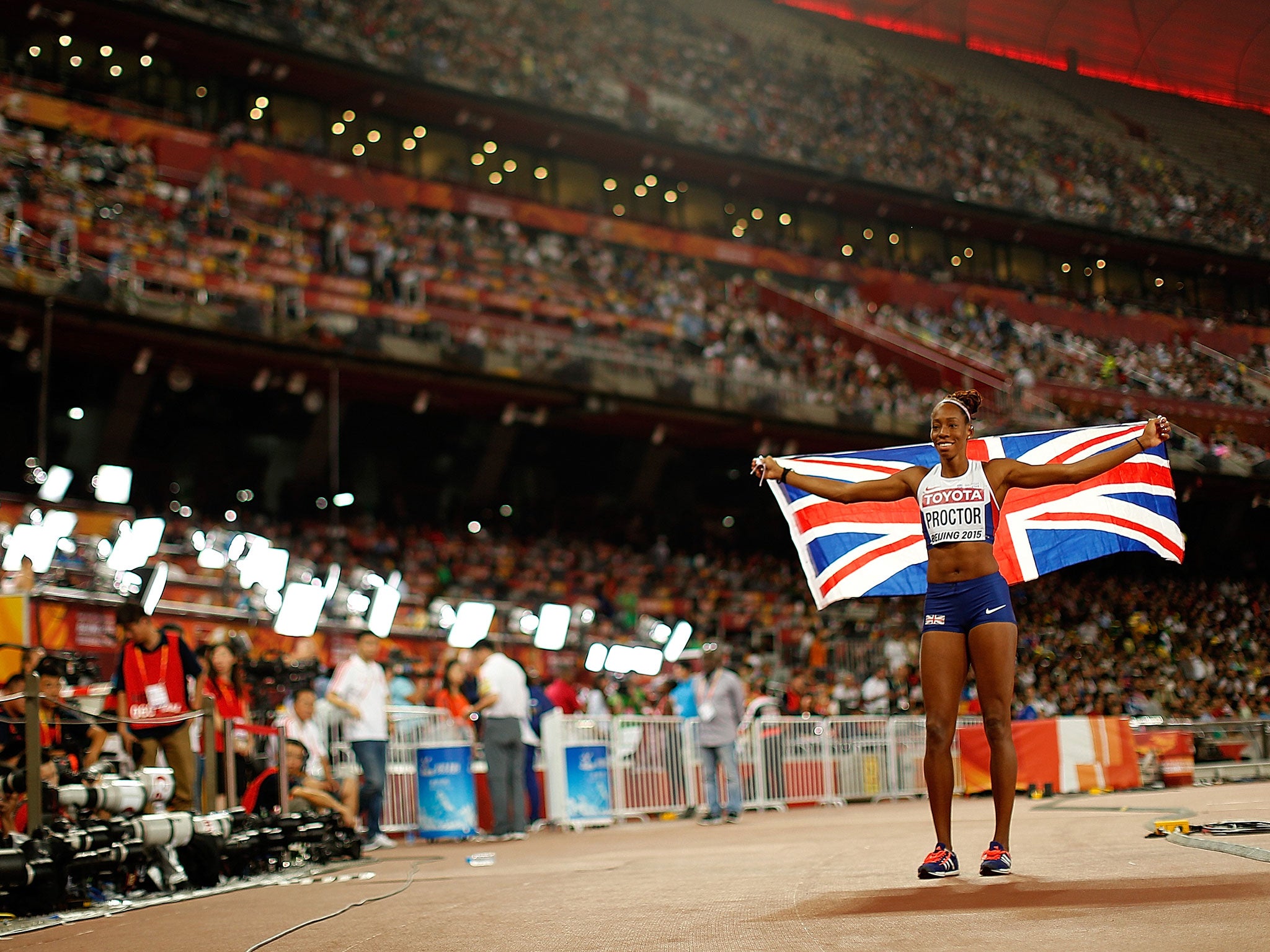Shara Proctor leaps into record books at World Championships to land silver medal for Great Britain
British long-jumper denied gold in final round but more woe for Katarina Johnson-Thompson

It was a combination of agony and ecstasy for Shara Proctor as she came within a solitary long jump of winning Britain’s fourth gold of the World Championships.
But for Katarina Johnson-Thompson it was agony pure and simple, another competition to forget, capping what she described as the “worst week of my life”.
Proctor had warned she was in seven-metre shape going into the championships, and so it proved as she twice jumped beyond that figure, for the first time in her career, setting a British record of 7.07 metres as she claimed silver.
As the sand flicked around her after her third-round effort, it looked as if gold was assured, which would have given Britain their most successful gold-medal haul in World Championships history.
Achieving that feat will instead rest on the shoulders of Mo Farah, who bids for his second gold in Beijing in Saturday’s men’s 5,000m.
In a dramatic finale to the competition, Proctor was denied by the American Tianna Bartoletta, who produce a final-round jump of 7.14m, to which Proctor had no reply.
In stark contrast, Johnson-Thompson, for whom the long jump was her undoing in the heptathlon, faltered during her shot at redemption, managing a best of 6.63m to leave her last but one of the 12 finalists and resulting in her being cut from the competition after just three rounds.
For Proctor, the silver medal was a remarkable turnaround for an athlete of such humble sporting beginnings, who this time last year was on crutches following a thigh injury.
Despite the dramatic way in which she was pipped to the gold medal, Proctor said: “It’s a silver medal, but I still feel like a winner. It’s been a long ride. I was on crutches this time last year. I had to learn to walk, I had to learn to run, and today I just threw it all together and finally executed.”
British Athletics’ performance director, Neil Black, had singled out Proctor before the championships as an example to her team-mates for her tireless hard work in getting back to full fitness, which she described as “blood, sweat and tears”.
Her longer journey is even more remarkable. On the Caribbean island of Anguilla, there is a solitary grass running track and, at the end of a cracked runway, a long-jump box partially filled with sand.
It was there that Proctor was first introduced to the sport, sharing the space with the local cricket team and dodging cricket balls as well as side-stepping potholes in the ground during her run-up. Coaxed by her mother, she eventually picked athletics over her other sporting love, football.
The difficulties of training in such conditions changed in 2010 when she was brought into the British Athletics set-up to pursue her Olympic dream. Anguilla does not boast its own national Olympic committee and hence its athletes are not eligible for the Games, but she qualified for her adopted nation because Anguilla is a British Overseas Territory.
It is a journey that has taken her from Anguilla to Florida, where she first worked with her coach Rana Reider, the Dutchman who guided Christian Taylor, of the United States, to triple jump gold this week. The trio’s nomadic existence has also taken in Loughborough and Holland thanks to Reider’s subsequent relocations.
Taylor was in the stands shouting his support while Reider was barking instructions. He embraced his athlete warmly and happily, despite the change in her fortunes at the competition’s end.
A year ago she was forced out of the Commonwealth Games with injury, and Proctor admitted: “I felt defeated. I used my injury last year as motivation. I was told I wouldn’t be strong enough to be here today and I had that at the back of my mind. I had to prove some people wrong.”
She knew seven metres was the very least she required for gold and duly delivered at her third attempt, by which point Johnson-Thompson was out of the competition.
“I’m sorry she had a tough week,” Proctor said of her team-mate, “but she’ll bounce back, she’s a champion.”
But Johnson-Thompson, who had gone through what she called a “walk of shame” to complete the final two heptathlon events after her three red flags in the long jump, in order to be eligible to compete in the individual event, may have wished she had flown home after the multi-event.
“It’s probably the worst week of my life,” she said. “It has been a massive learning curve and that is it. I think the positives are that I am never going to let this happen again. Me and my coach are going to go into winter training very motivated to come out and do myself justice.”
Arguably the least heralded of the British trio in the final, Lorraine Ugen, managed a best jump of 6.85m to finish fifth overall.
But Proctor, as she has been all season, was the pick of her countrywomen, following a long jump competition in which all three medallists – Serbia’s Ivana Spanovic won bronze – surpassed seven metres for the first time in the history of a major championships.
The 26-year-old Proctor, who relied heavily on the aforementioned Taylor and long jump gold medallist Greg Rutherford in the days leading up to the final, was not ashamed to admit she thought the gold was in the bag when she jumped 7.07m, and then backed it up with a subsequent leap of 7.01m.
In the end, it proved the ultimate silver lining, which she confidently predicted would be greeted with a carnival in Anguilla.
Join our commenting forum
Join thought-provoking conversations, follow other Independent readers and see their replies
Comments
Bookmark popover
Removed from bookmarks